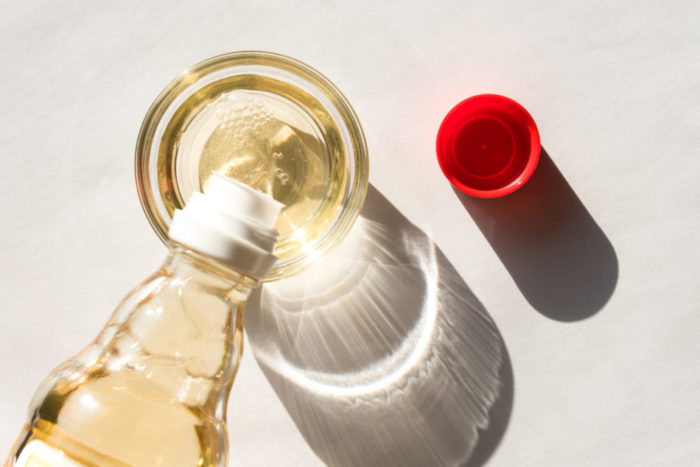
Rice wine is an ingredient in several Asian recipes. While famous in different forms and different names throughout Asia, it isn’t as easily available in other parts of the world. So, what do you do if you’re trying your hand at Chinese cuisine and can’t get a hold of the wine? Picking a good Chinese rice wine substitute is the answer.
As with most recipe substitutions, no single ingredient provides the exact replacement. Equally important, you have to know the kind of rice wine that needs substitution.
Rice wine used in Chinese cuisine can be Mijiu, Choujiu, or Huangjiu, though other varieties are available as well. In some cases, it might be necessary to consider the wine type before picking a replacement.
It’s worth noting that rice wine is popular in Asian cuisine and used throughout East Asia. Apart from Chinese rice wines, Japanese sake, Korean makgeolli, and Filipino Kulapo are well-known rice wines. While this article is primarily about Chinese wines, we’ll occasionally consider other rice wines as well.
So, let’s take a dive!
Top Chinese Rice Wine Substitutes To Try
1. Pale Dry Sherry
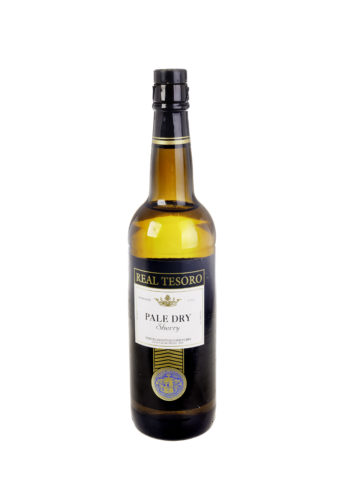
Using pale dry sherry is an excellent way to replace Chinese rice wines. It is a competent choice and comes close as a substitute for Shaoxing rice wine. Sherry is easily available and provides a taste well-suited for the western palate.
In fact, it works so well that many recipe books in the west skip Chinese rice wine as an ingredient and use dry sherry instead. The similarities in color and texture work well for this substitution.
In most cases, you can replace Chinese rice wine with pale dry sherry in equal amounts (1:1 ratio).
2. Sake
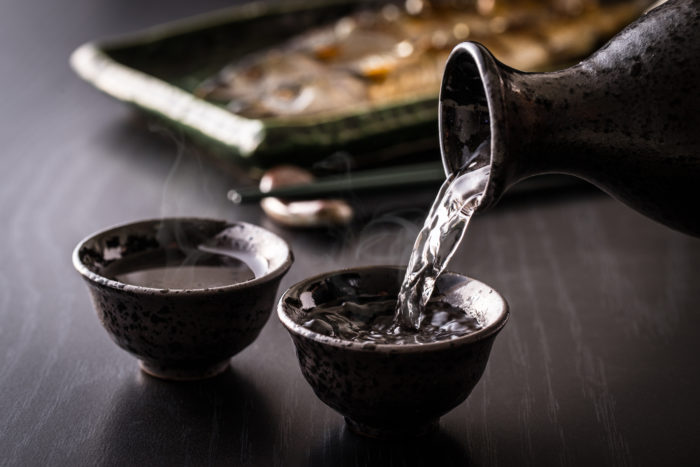
Sake, as we know, is a famous Japanese rice wine. You can shoehorn it as a replacement to Chinese rice wine, though it brings a different taste to the dish. If you’re looking for authenticity, this is a dealbreaker. But as plenty of cooks have found, the unique taste that sake brings to the dish is something that can be relished as much as rice wine.
So this substitution comes down to personal preferences and tastes. You can replace Chinese rice wine with equal amounts of sake. When you make this substitution, count on a change in flavor for the dish. But you can rest easy in the knowledge that many cooks and chefs prefer this substitution.
3. Gin

Gin is an unlikely, but surprisingly good replacement for rice wine. Use it for white rice wines, not clear ones like Shaoxing wine. Gin has an excellent flavor and will work as a good substitute. It doesn’t overwhelm the original flavors of the dish but provides excellent taste and flavor for a recipe.
When using this substitution in a recipe, use an amount of gin equal to the amount of rice wine called by the recipe. This makes the replacement simple and straightforward. There are bound to be some changes in taste though, but there is a way around. Adjust the amount of spices in your recipe to get a greater depth of flavor.
4. White Wine

Dry white wine is one of the more popular options to pick. Wherever possible, a recipe will work well with the addition of dry sherry or gin. But if you want a different flavor and can’t get a hold of Chinese rice wine, white wine will do the trick.
It’s best used with marinades, but you can try your hand at other options too. Though not an ideal one, it is a decent option for substitution.
5. Mirin
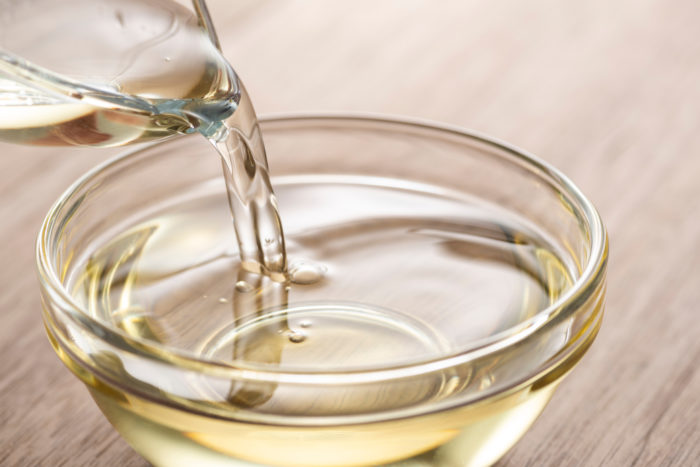
Mirin is another Japanese rice wine and will work as a substitute in a pinch. There is a need to be more careful when exercising this option. Mirin has a stronger flavor as compared to sake or rice wine and tends to be noticeably sweeter.
To manage this strong flavor and sweetness, start by adding small amounts of mirin to the recipe. If you find the taste encouraging enough, you can add more mirin to the recipe. You can use ½ a spoon of mirin to replace a spoon of Chinese rice wine. If you can deal with the flavor and sweetness, use one spoon of mirin for every spoon of Chinese rice wine.
6. Apple Juice
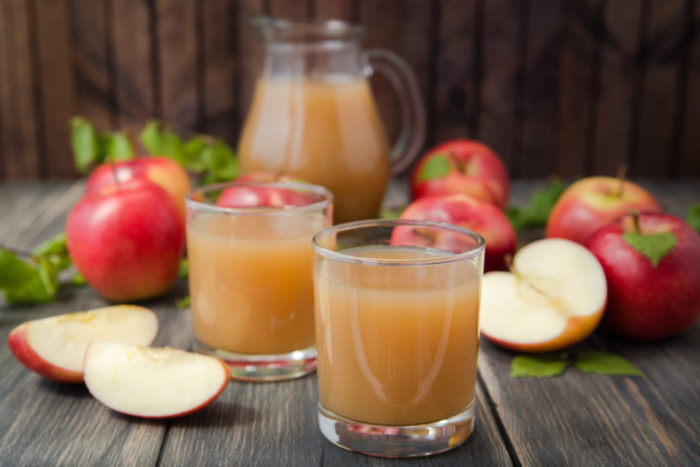
Need a quick non-alcoholic option for a recipe? Give apple juice a chance. On the face of it, comparing apple juice to rice wine seems absurd – almost like comparing apples to oranges! Make no mistake, this apple juice will deftly replace Chinese white wine.
Its acidic and sweet taste poses a small challenge. Apple juice will affect the flavor of a recipe. Yet, its qualities make it suitable for a good range of dishes. Apple juice is an acceptable alternative in stir-fry recipes, marinades, and maybe even cooking vegetables.
The acid in the juice works as a tenderizer and works great for dishes containing meat. Apart from a change in other flavors, the juice will also bring a fair bit of sweetness.
7. Grape Juice
Using white grape juice largely follows the logic of using apple juice. The acid in the juice works as a tenderizer and can help with marinades and some dishes containing meat. Of course, this one too will add a different flavor and some sweetness to your recipe.
Juices like grape and apple are useful because though they change the flavor, they don’t have an overpowering taste. Something like lemon juice, on the other hand, could potentially alter the taste rather drastically.
Yet, these juices shouldn’t be your first choice unless you’re utterly out of options. Use grape juice in the same quantity as the Chinese rice wine (1:1 ratio).
8. Vegetable Stock
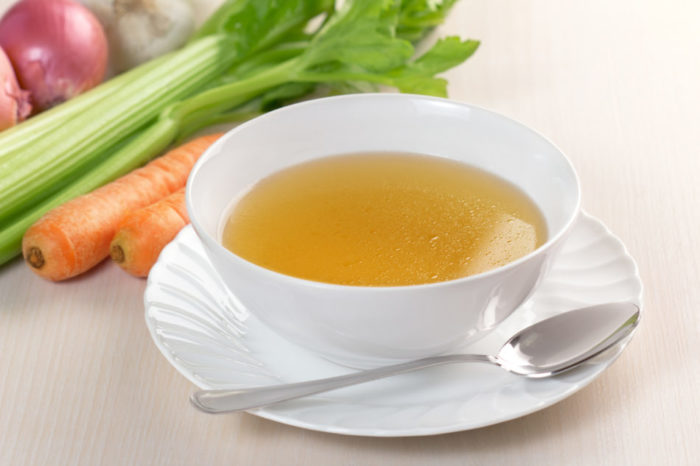
The classic vegetable stock can be a somewhat decent alternative to Chinese rice wine. Even so, its use and possibilities as a substitute are limited. It will work for stews and soups, but expect significant changes to flavor and texture.
Vegetable stock doesn’t have that pronounced a flavor, so the replacement will demand the use of a lot more stock as compared to the quantity of wine. Adding some white vinegar can help better this flavor. It may be useful to reduce the amount of water in the dish, or even replace it entirely with stock.
9. Chicken Stock
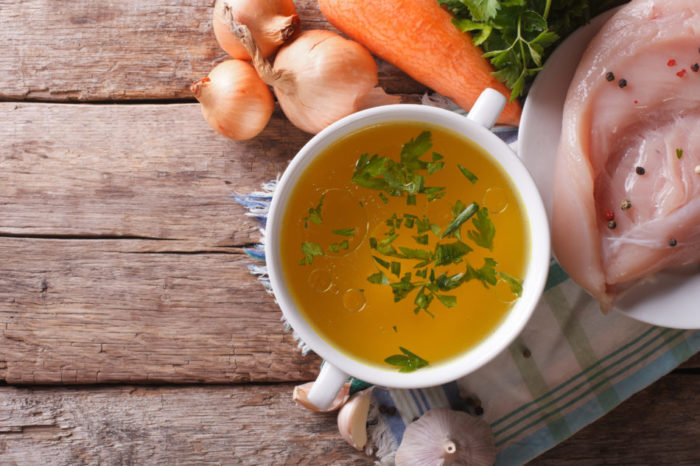
Chicken stock works pretty much the same as vegetable stock, but it’s best used for recipes that contain chicken. When using this substitution, you’ll need to adjust the amount of water in the recipe.
Additionally, it won’t give the dish the acidity or the sweetness that comes with the use of Chinese rice wine. Some adjustments, like the use of sugar, could be necessary to spice things up. Consider adding white vinegar to chicken or vegetable stock, so the replacement gets a sharper and better taste.
Again, it’s worth noting that chicken or vegetable stock should not be the first options to consider for alternatives. Use them as the last resort!
Learn more: 10 Chicken Stock Concentrate Substitutes to Try
Ingredients To Avoid Using As Substitutes For Chinese Rice Wine
1. Chinese Rice Wine Vinegar
Ever wondered how different could Chinese rice wine vinegar be from Chinese rice wine?
The answer is very different! Vinegar is not wine and it is very acidic. Rather than functioning as a good substitute, it will cause problems and drastically alter the dish. Very likely, this change won’t be for the better.
2. White Vinegar
Vinegar, as we already know, is no substitute for the flavors of Chinese rice wine. White vinegar is quite intense and acidic. It will considerably change the flavor and taste of the dish.
3. Cooking Wines
The name might suggest that these cooking wines would be suited for use in preparing food. Unfortunately, that’s rarely true. These wines tend to be packed with salt and are rather low on flavor. Cooking wines have their uses, but they’re not the right pick to replace Chinese rice wines.
Rice Wine vs Rice Wine Vinegar – All You Should Know
Rice wine and rice wine vinegar sound similar. They should be pretty close in taste, right? Well, no!
Rice wine and rice wine vinegar (also known as rice vinegar) are entirely different beasts. They have some similarities, sure, but they have huge differences to set them apart. Let’s see how they work out.
Production And Processing
As the name suggests, rice wine and rice vinegar both come from rice.
For rice wine, the exact process can vary with the wine type. However, the basics of the process stay the same. Yeast, fungi, and lactic acid bacteria work on rice starch to ferment it. As the fermentation process concludes, the resulting ingredient we get is rice wine. Further changes or processing will result in different kinds of rice wine.
Vinegar follows a similar fermenting process, but with a twist. The rice starches here are fermented using acetic acid bacteria. A bacteria like Mycoderma aceti (mother of vinegar) can be used. The process generally involves converting the starch to alcohol and then processing this alcohol into acid.
This is also a reason why poorly stored wine can turn into vinegar. Improper processing and storage will cause bacteria to convert the alcohol into acetic acid.
The Nutritional Element
Have you ever heard of the nutritional qualities of wine and vinegar? Probably not, because there aren’t any. Don’t get me wrong here, you can find plenty of information on the health benefits of vinegar and perhaps even rice wine. Though by themselves, these don’t quite pack nutritional value.
A small serving of wine, 5 oz. would have around 200 kcal energy, some carbohydrates, and no sugar or salt. Unsweetened vinegar has no calories or carbs. Sweetened or spiced vinegar will have calories, carbs, sugar, and salt depending on the seasoning.
Taste
Chinese rice wine like Huangjiu has a mild, somewhat sweet flavor. There might be a change in the strength of the wine or flavor depending on the type of wine. Generally speaking, Chinese rice wines don’t tend to be overly heavy on alcohol.
The use of various herbs, spices, and alterations to the fermentation can change the taste and flavor of the wine.
The alteration of taste due to seasoning stands true for rice vinegar as well. However, it tends to have a somewhat sweet taste, much like apple cider vinegar.
The Obvious Element – Alcohol vs Vinegar
Chinese rice wine has alcohol content, while rice vinegar doesn’t have alcohol. This alcohol content varies depending on the type of wine, but it is often on the lower side of things as compared to western wines.
Apart from drinking, Chinese rice wines are often used for cooking as well. A good portion of Chinese cuisine depends on the use of these wines.
Vinegar is often used for marinades, sauces, and even sushi! While its use is a departure from the traditional process, vinegar adds flavor and aids in quicker preparation of sushi.
Top Substitutes For Rice Vinegar
We’ve already discussed the substitutes of Chinese rice wine in detail. Here’s a quick list of the substitutes of rice vinegar:
- Apple cider vinegar: the mild color and flavor go well with several recipes.
- Wine vinegars: Red wine vinegar, sherry vinegar, and white wine vinegar have a similar flavor as rice wine vinegar.
- Lemon juice: The acidic setup and taste of lemon juice make it a good substitute for rice vinegar in salads and dressings.
- Champagne vinegar: Once turned to vinegar, champagne gets a good mild taste and flavor that can substitute rice vinegar.
Top FAQs
What Does Shaoxing Wine Taste Like?
Shaoxing wine is unique in its odor as well as its taste. Interestingly, it doesn’t quite smell like alcohol. Instead, this wine has a complex aroma which adds to the flavoring and goodness of meals that it cooks.
The wine has a somewhat mild, yet distinctive taste. It offers hints of spice and caramel with a touch of a vinegary feel. The alcohol content is usually over the top and generally rounds up at around 14 percent.
Can I Omit Shaoxing Wine In A Recipe?
This Chinese rice wine forms the heart of several recipes. Although in some recipes, it is used sparingly, much like a condiment. If your recipe calls for using a spoonful (or less) of shaoxing rice wine, you can safely omit using it. For recipes that use larger quantities, you should use the correct ingredients. In some cases, you can try a substitute like dry sherry wine.
Can I Use White Vinegar Instead Of Rice Wine?
White vinegar is not a useful ingredient to replace Chinese rice wine in a recipe. Its taste and flavor are very different and will change the recipe. But if you’re in a pinch, mix some vinegar with vegetable stock or chicken stock for replacing rice wine.
By dilution in the stock, the vinegar gets a milder flavor and enhances the taste of the stock. While this mix isn’t an ideal substitute, it manages to hold its own fairly well.
Conclusion
Chinese rice wine as a generic term can refer to several rice wines that are popular in China and used in Chinese cuisine. So, your choice of Chinese rice wine substitute will depend on the specific wine being used in the cuisine. For many recipes, pale dry sherry works perfectly as a substitute. For others, you can consider options like gin, white wine, and juices like apple and white grape.